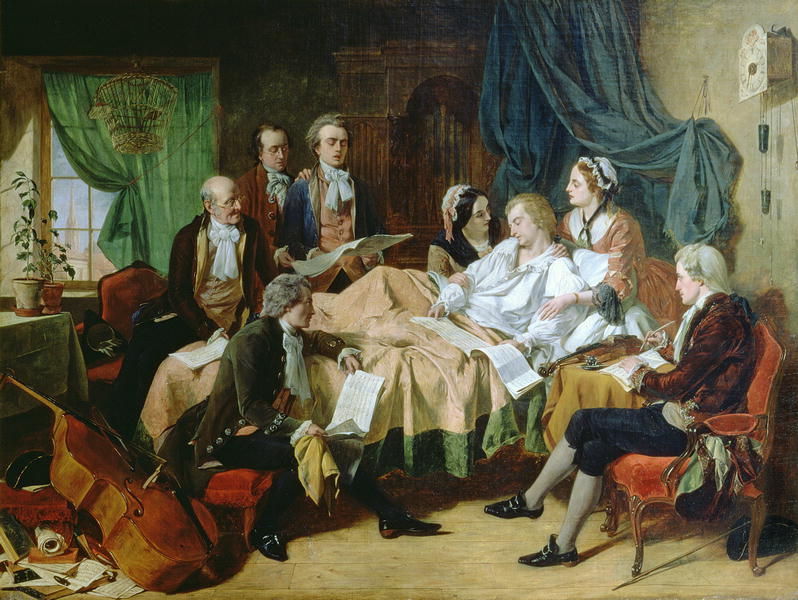Most Incredibly Dramatic
Final Works
By Composers
Final Works
By Composers

Mozart on his deathbed
Not all composers benefit from having their last works be masterworks. But a number have been able to create profound and lasting artistic statements in the final pieces they wrote before they died, a correlation that music historian Jan Swafford
has explored. These five works all show their composers at the height of their powers, even though they all would pass on shortly thereafter.
Mozart’s Requiem is perhaps the most renowned work—not solely in classical music—but among all artist endeavors that was partially written in a deathbed. The circumstances surrounding the work are almost as famous at the music itself: A cloaked, mysterious stranger offered Mozart the commission on the behalf of an anonymous patron. However, while Mozart was composing the piece, the work seems to have become more and more about its author facing his last days. Upon its premiere, the Requiem appeared under the name of the man who commissioned it, Count Franz von Walsegg, but several years later, Constanze Mozart convinced him to give credit to the true composer. Walsegg called it Mozart’s swan song.
Mozart
Requiem in D minor, K626
John Eliot Gardiner
Barbara Bonney, Soprano.
Anne Sofie von Otter, Mezzo-soprano
Anthony Rolfe Johnson, Tenor.
Alastair Miles, Bass.
Monteverdi Choir English Baroque Soloists
Filmed at the Palau de la Música Catalana, Barcelona, in December 1991.
Anne Sofie von Otter, Mezzo-soprano
Anthony Rolfe Johnson, Tenor.
Alastair Miles, Bass.
Monteverdi Choir English Baroque Soloists
Filmed at the Palau de la Música Catalana, Barcelona, in December 1991.
2. Bela Bartok: Piano Concerto No. 3
News of Bela Bartok’s failing health had spread through music circles when Serge Koussevitzky commissioned him to write what would become his great Concerto for Orchestra. However, the final piece Bartok’s wrote was the Third Piano Concerto, which he composed during the summer of 1945, while he was hospitalized with the final stages of leukemia. He was able to finish all but the last 17 bars before he died on September 27 of that year. The work was
intended as a present to his wife Ditta, who was, like her husband, an esteemed pianist.
András Schiff - Bartók
Piano Concerto No 3 in E major, Sz 119
Piano Concerto No 3 in E major, Sz 119
3. Richard Strauss: Last Four Songs
Richard Strauss may not have intended his Last Four Songs to be the final four works that he would write, even though three of the four deal explicitly with death and he was in his mid-80s at the time. He composed them individually. The first three, Frühling, September, Beim Schlafengehen, are based on poems by Herman Hesse. The fourth Im Abendrot uses a Joseph von Eichendorff text. Written one year before he died in 1949, they were titled, published and premiered with Kristen Flagstad and the Philharmonia Orchestra in London, all posthumously.
Richard Strauss - Vier letzte Lieder
Four Last Songs
Jessye Norman - Beim Schlafengehen
Four Last Songs
Jessye Norman - Beim Schlafengehen

4. Pergolesi: Stabat Mater
Giovani Battista Pergolesi was already in poor health when he was
commissioned to write his Stabat Mater. However, his condition worsened
in as he worked on the score. In 1736, suffering from what appears to
have been tuberculosis, Pergolesi moved into a Fransican monastery
outside of Naples. He successfully completed the score, but died only
weeks later at the age of 26. In death, the composer achieved greater
fame, says Baroque music specialist Simon Heighes: "Just when everyone realised what a good thing he was... it was too late.”
Giovanni Battista Pergolesi
"Stabat Mater" (1736)
"Stabat Mater" (1736)
Stabat Mater
for soprano, contralto, strings and basso continuo
by Giovanni Battista Pergolesi (1710-1736)
Margaret Marshall (soprano)
Lucia Valentini Terrani (contralto)
Leslie Pearson (organ)
London Symohony Orchestra
Claudio Abbado (conductor)
Recorded in 1985

- 00:00 "Stabat Mater Dolorosa"
- 04:39 "Cujus animam gementem"
- 07:47 "O quam tristis et afflicta"
- 10:22 "Quae moerebat et dolebat"
- 13:12 "Quis est homo"—"Pro peccatis suae gentis..."
- 16:14 "Vidit suum dulcem natum"
- 19:48 "Eja mater fons amoris"
- 22:42 "Fac ut ardeat cor meum"
- 25:23 "Sancta mater, istud agas"
- 31:22 "Fac ut portem Christi mortem"
- 35:06 "Inflammatus et accensus"
- 37:57 "Quando corpus morietur" —"Amen..."

5. Schubert: Winterreise
Franz Schubert was confined to his bed, dying of what probably was
syphilis when he began correcting the proofs of the second book of his
song cycle Winterreise. He began composing the piece, a set of
24 songs that narrate a man’s journey outside on a cold wintry night,
toward his eventual death, just over a year earlier and the first book
of 12 songs had been published. But the second dozen songs, which
contain the most chilling moments, such as the final “Der Leiermann” were published posthumously.
http://www.wqxr.org/#!/story/five-most-dramatic-final-works-composers/?utm_source=local&utm_media=treatment&utm_campaign=carousel&utm_content=item2
Der Leiermann
24th Lieder from Die Winterreise
Music by Franz Schubert to a poem by Wilhelm Müller
Performed by Dietrich Fischer-Dieskau (baritone) and Alfred Brendel (pianist).
Music by Franz Schubert to a poem by Wilhelm Müller
Performed by Dietrich Fischer-Dieskau (baritone) and Alfred Brendel (pianist).
http://www.wqxr.org/#!/story/five-most-dramatic-final-works-composers/?utm_source=local&utm_media=treatment&utm_campaign=carousel&utm_content=item2

